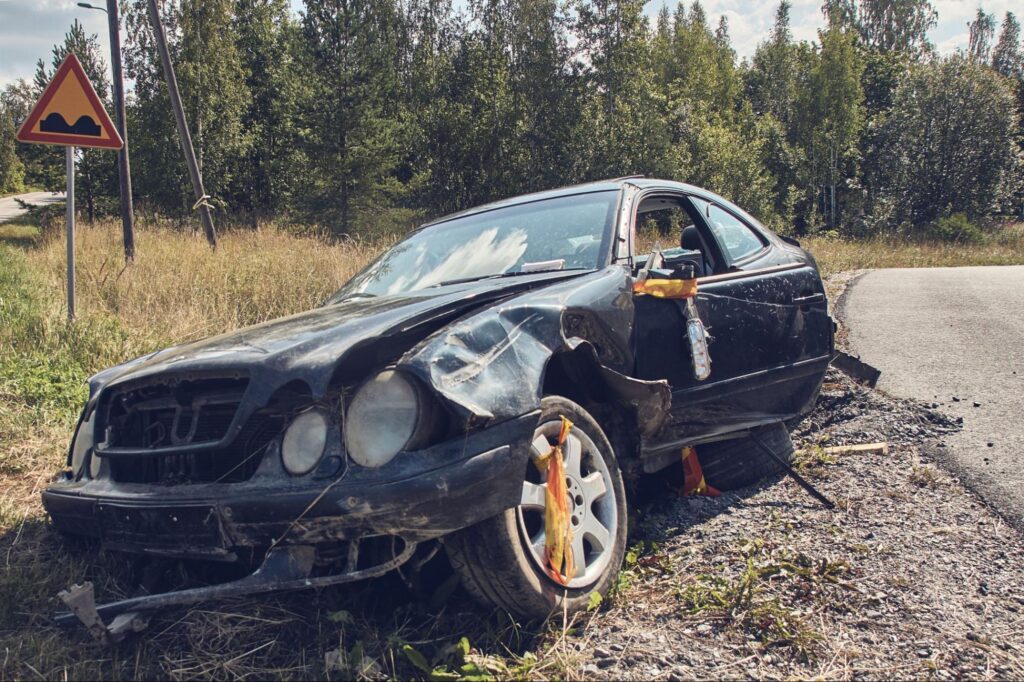After a car accident, victims often face many challenges, including medical bills, vehicle repairs, and income loss. One critical aspect of this situation is understanding who pays for lost wages in a car accident.
Understanding how lost wages are calculated, who is responsible for compensating them, and the legal avenues available for recovery can significantly impact an accident victim’s financial outcome. Howe Law can help guide you through this process and ensure you receive the compensation you deserve.

Understanding Lost Wages in Car Accident Claims
Lost wages refer to the income a person fails to earn due to an inability to work caused by injuries sustained in a car accident.
Research shows that around 1.19 million people lose their lives annually due to road traffic accidents.
These losses can be a significant financial burden for many accident victims, making establishing the legitimacy and value of lost wages in a claim is essential.
The impact of lost wages can extend beyond mere financial strain; it can affect an individual’s ability to meet daily living expenses, pay bills, and maintain their standard of living during a challenging recovery period.
Definition of Lost Wages
Lost wages, in the context of car accident claims, are typically calculated based on the income a person would have earned had the accident not occurred. This encompasses regular wages, overtime, bonuses, and even benefits that the individual may have missed out on during their recovery period.
Additionally, it’s important to recognize that lost wages can also include income from side jobs or freelance work that the individual may have engaged in prior to the accident, which can further complicate the calculation process.
Calculating Lost Wages
To effectively calculate lost wages, there are several steps to take:
- Documentation: Collect pay stubs, tax returns, or any other records that substantiate your income level before the accident.
- Duration of Absence: Determine the length of time you were unable to work due to your injuries. This can sometimes be tricky, particularly if recovery takes longer than anticipated.
- Future Earnings: If applicable, consider potential losses in future earnings, particularly in cases involving long-term disabilities or impairments.
Often, accident victims may need to work with financial professionals or legal advisors to ensure their lost wages are accounted for in their claims. In addition to these calculations, it is vital to consider the emotional and psychological toll that being unable to work can have on an individual.
The stress of financial instability can exacerbate feelings of anxiety and depression, making recovery even more challenging.
Furthermore, if the accident has resulted in a permanent disability, the implications for lost wages can be profound, potentially affecting not just the individual but their entire family unit as they navigate the complexities of long-term financial planning and support.
Role of Auto Insurance in Covering Lost Wages

Auto insurance is pivotal in covering lost wages following a car accident. Various types of insurance can address this concern and provide compensation, albeit under different circumstances.
Understanding Personal Injury Protection (PIP)
Personal Injury Protection (PIP) is a type of auto insurance that covers medical expenses, rehabilitation costs, and lost wages regardless of who is at fault in an accident.
This coverage is typically mandated in no-fault states, where each party’s insurance pays for their own losses. For those with PIP coverage, it is vital to understand the limits and conditions of this insurance to ensure maximum recovery.
In many cases, PIP can cover a significant portion of lost wages, often up to a predetermined limit, which can be especially beneficial for individuals who rely heavily on their income to support their families.
Additionally, PIP may also extend to cover essential services that the injured party can no longer perform, such as childcare or household chores, further alleviating the financial burden during recovery.
Uninsured/Underinsured Motorist Coverage
Uninsured or Underinsured Motorist Coverage serves as extra protection when the responsible party either lacks insurance or does not have sufficient coverage to address the damages incurred.
This policy can also cover lost wages if the other driver is deemed at fault but cannot fulfill their financial obligations due to lacking insurance.
However, knowing your policy’s specifics is essential, as these coverages can differ from state to state. In some jurisdictions, this coverage may also include compensation for pain and suffering, which can be a critical factor in the overall recovery process.
Furthermore, understanding the nuances of how these policies interact with PIP and other forms of coverage can empower drivers to make informed decisions about their insurance needs, ensuring they are adequately protected in the event of an accident.
The Legal Perspective on Lost Wages
From a legal standpoint, proving lost wages can be critical in personal injury lawsuits or settlement negotiations following a car accident. Successfully establishing lost income can significantly influence the compensation awarded to the victim.
In many cases, the financial burden of lost wages can compound an injury’s emotional and physical toll, making it imperative for victims to understand their rights and the legal processes involved in claiming these losses.
Proving Lost Wages in Court
When pursuing lost wages in a legal context, a plaintiff must provide substantial evidence to support their claim. This may include:
- Pay stubs and tax documents.
- Testimony from employers or coworkers regarding the impact of the injury on the victim’s ability to work.
- Medical records illustrate the severity of the injuries and the period of recovery required.
Additionally, it may be beneficial to receive expert testimony from economists or vocational experts who can assess the financial impact of the injuries on future earning capacity.
These experts can provide insights into how the injury may hinder the victim’s career trajectory, potentially affecting promotions, job stability, and overall earning potential. By presenting a comprehensive view of the financial implications, plaintiffs can strengthen their case and advocate for fair compensation.
Legal Limitations and Considerations
Legal time limits, known as statutes of limitations, may affect the ability to pursue a claim for lost wages. These statutes differ based on the state in which the accident occurred and can significantly impact the success of a claim.
Understanding these limitations and any applicable exceptions is essential for any accident victim, making it prudent to seek legal advice when needed.
Furthermore, victims should be aware that certain jurisdictions may have specific requirements for documenting lost wages, such as the need for detailed records of missed workdays or the necessity of filing claims within a designated timeframe post-accident.
This underscores the importance of meticulous record-keeping and timely legal action to ensure that all potential claims are preserved and pursued effectively.
Dealing with Lost Wages in Different States
The approach to lost wages claims can vary considerably depending on state laws. States typically have two types of claims: no-fault and at-fault.
No-Fault States vs. At-Fault States
In no-fault states, individuals generally rely on their PIP coverage to recover lost wages regardless of who caused the accident. This system minimizes the need for litigation and streamlines compensation, though coverage limits might exist.
For instance, some no-fault states may have a threshold for medical expenses or a specific duration of lost wages that must be met before claims can be filed.
This can lead to confusion for those who are unaware of the specific requirements, making it essential for victims to familiarize themselves with their state’s regulations.
In contrast, at-fault states allow victims to pursue claims against the responsible party’s insurance. In these cases, establishing liability becomes essential, and victims can claim lost wages as part of a broader claim for damages.
The process can be more complex, as it often involves gathering evidence, such as police reports and witness statements, to prove fault. Additionally, victims might need to negotiate with insurance adjusters, which can be daunting if they are unfamiliar with the claims process.
State-Specific Insurance Laws
Each state has unique insurance regulations governing the treatment of lost wages. Some may impose caps on coverage amounts or specific procedures for filing claims.
For example, in some states, the insurance company must be notified within a certain timeframe after the accident; otherwise, the claim could be denied.
Additionally, states may differ in their definitions of what constitutes “lost wages,” with some including benefits like overtime and bonuses, while others may not. Therefore, understanding the local laws is crucial for ensuring proper compensation for lost wages.
Moreover, the nuances of state-specific laws can also affect how long individuals have to file a claim for lost wages. Statutes of limitations can vary widely, with some states allowing only a few months to file a claim while others may provide several years.
This can significantly impact a victim’s ability to recover lost income, especially if they are still recovering from their injuries or are unaware of their rights.
Therefore, it is advisable for individuals to consult with legal professionals who are well-versed in their state’s laws to effectively navigate the complexities of lost wage claims.
Long-Term Implications of Lost Wages
The ramifications of lost wages following a car accident extend beyond immediate financial losses. For many, the impact can be prolonged, affecting career trajectories and overall financial stability.
Lost Earning Capacity
In some cases, the injuries sustained in an accident can result in a diminished earning capacity, meaning that an individual may not be able to earn the same income they once did. This aspect is vital to consider when calculating lost wages, as it can have a cumulative effect on long-term financial health.
Factors that can contribute to lost earning capacity include:
- Extent and nature of the injuries.
- Availability of work in the individual’s field.
- Changes in job market conditions.
Moreover, the psychological impact of an accident can also play a significant role in a person’s ability to return to work.
Many individuals experience anxiety, depression, or post-traumatic stress disorder (PTSD) following a traumatic event, which can hinder their performance and willingness to re-enter the workforce. This emotional toll can be just as debilitating as physical injuries, leading to further complications in career advancement and job satisfaction.
Financial Planning After a Car Accident

Due to the potential for ongoing financial challenges after a car accident, prudent financial planning becomes essential. Crafting a robust budget, reassessing insurance coverage, and seeking advice from financial professionals can help accident victims navigate their new circumstances more efficiently.
Additionally, exploring options for additional income or retraining for new career paths might be necessary for long-term recovery and stability.
Many individuals may find that their previous job roles are no longer viable due to their injuries, prompting the need for skills development or education in a different field. This transition can be daunting but may lead to new opportunities that align better with their current capabilities and interests.
Furthermore, establishing a support network can be invaluable during this challenging time. Engaging with community resources, support groups, or online forums can provide emotional support, practical advice, and even job leads from others who have faced similar situations.
The journey to recovery is not just about physical healing; it also involves rebuilding one’s financial and professional life, which can be greatly aided by the experiences and insights of others.
Conclusion
Anyone involved in a car accident must understand the process of recovering lost wages. By grasping the nuances of insurance coverage, legal implications, and the varying laws across states, accident victims can take more informed steps toward regaining their financial footing.
Seeking professional guidance is often valuable in ensuring that all potential compensation avenues are explored and pursued effectively.
Call today for a free consultation at 888-559-7612. We’re available 24/7 to provide the support you need. Visit Howe Law and let us help you recover what you deserve.
Related Articles


























































